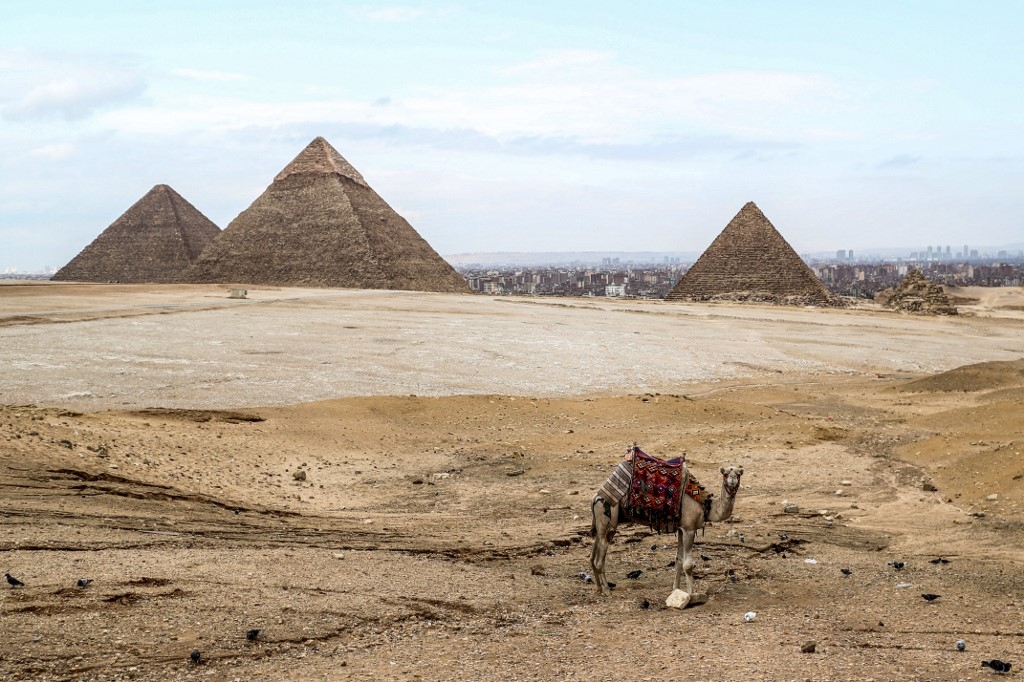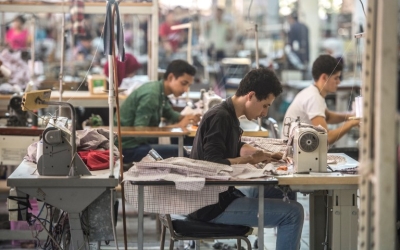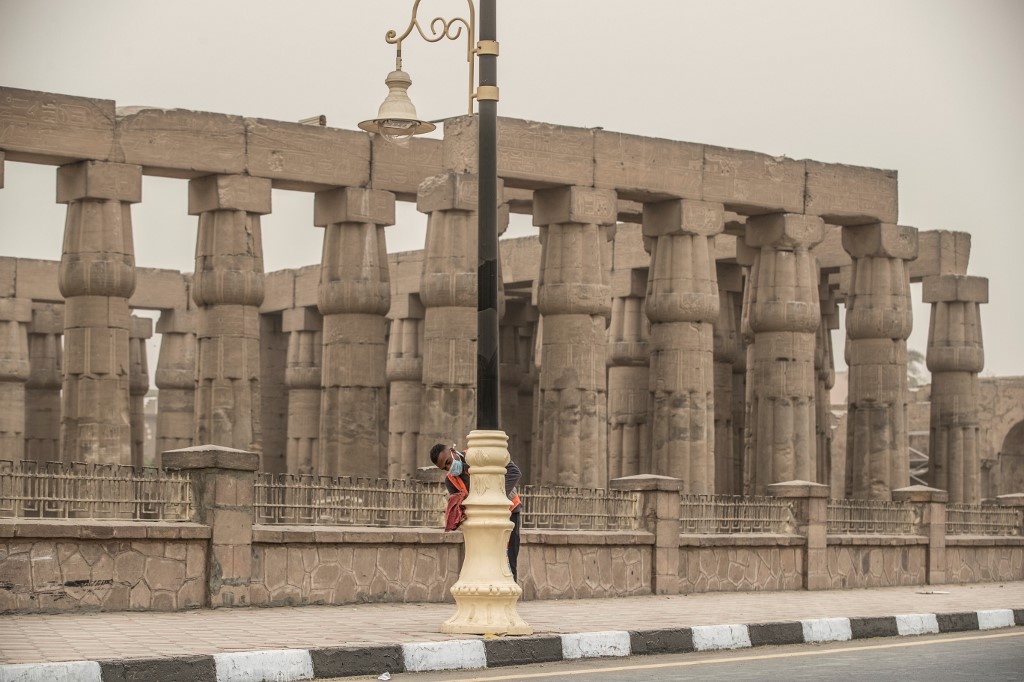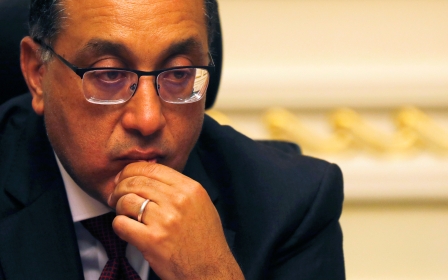Coronavirus: Egypt gradually reopens hotels to prevent collapse of tourism sector

Egypt has started operating its hotels once more after almost a month and a half of closure due to coronavirus, amid hopes that the move will put the tourism sector back on track to staunch the losses it has sustained in the recent period.
Egyptian authorities closed hotels and the whole tourism sector in late March, after initially suspending flights to and from Egypt on 19 March, for fear of a Covid-19 outbreak that first hit the populous country in mid-February.
Several hotels and resorts reopened as of 15 May. Others have applied to reopen after the new initiative to bring the tourism sector back to work.
'The closure of hotels was very important for curbing coronavirus infections'
- Magdi Selim, tourism analyst
The hotels and the resorts have to receive health certificates, demonstrating their compliance with coronavirus preventive measures, before they are allowed to re-operate.
The measures include testing incoming guests for the coronavirus, limiting the number of occupants inside each hotel room to two adults and a child and ensuring that each hotel has a clinic and a resident health specialist to respond to emergencies.
New MEE newsletter: Jerusalem Dispatch
Sign up to get the latest insights and analysis on Israel-Palestine, alongside Turkey Unpacked and other MEE newsletters
Pandemic hits tourism
The tourism sector has been the prime victim of the coronavirus-induced closures in Egypt, which have also included shopping malls, cafes, mosques, churches, schools, universities, theatres and cinemas.
This sector is especially important for the Egyptian economy as it contributes 11.3 percent of national income and employs over 12 percent of Egypt's workforce of 29 million.
When the coronavirus hit in China and other countries in December, Egypt tried to promote itself as a destination that was safe from the new disease.
Behind the campaigns by the Tourism and Antiquities Ministry launched at the time was the indispensable nature of the sector to the economy.
The tourism sector brings in around $1bn in revenues each month, according to Tourism and Antiquities Minister Khaled al-Anani.
Revenues from the tourism sector and those from other important sources, such as exports, migrant workers' remittances and the Suez Canal, helped stabilise the exchange rate of the Egyptian pound against all foreign currencies, especially the US dollar, for the past seven or eight months.
However, the same campaigns backfired when the nucleus of Egypt's coronavirus outbreak formed inside the tourism sector.
This happened in early March, when dozens of workers on a Nile cruise ship in the southern ancient city of Luxor tested positive for the coronavirus.
The workers caught the disease from a Taiwanese tourist who travelled from the Egyptian capital Cairo to the southern city of Aswan and then to Luxor, passing the contagion onto dozens of people on her way.
Alarmed at the new discovery, Egyptian health authorities tested all Nile cruise ship workers for the disease and then decided to suspend the work of cruise ships.
On 19 March, the Egyptian prime minister suspended air travel to and from Egypt as well as all domestic flights.
How the coronavirus impacted other sectors of Egypt's economy
+ Show - HideRemittances from migrant workers, an average of $2 billion a month, have not been affected by the coronavirus.
Revenues from the Suez Canal are also stable, while agricultural exports are growing, especially to Arab Gulf states where the disruption of the international supply chain is giving Egyptian crops an edge.
However, local production has been negatively affected by the partial lockdown imposed since 25 March.
Egypt's international reserves keep decreasing, having fallen down to $37 billion at the end of April, from $45.5 billion at the end of February, according to the Central Bank of Egypt.
The economy grew by 5 percent at the end of the third quarter of the fiscal year 2019/2020 (the end of March), from an expected 5.9 percent, Minister of Planning Hala al-Saeed, said at a meeting with the prime minister on 20 May.
Egypt also expects to lose 105 billion pounds (about $6.7 billion) this fiscal year, which ends in June, because of the coronavirus. This accounts for almost 2 percent of the gross domestic product registered in the fiscal year 2018/2019.
The economy is also expected to grow by 3.5 percent in the fiscal year 2020/2021 which will begin in July, from an expected 5.6 percent, only if the coronavirus crisis ends by the end of the current fiscal year.
This expected growth will drop to 2 percent only, if the crisis continues through December, al-Saeed said on 19 May.
These losses are exposing the vulnerabilities of the Egyptian economy and forcing Egypt into more borrowing.
On 11 May, the International Monetary Fund approved an emergency financing of $2.77 billion to assist Cairo respond to the coronavirus, amid reports that Egypt would request up to $9 billion in funds from the international lender.
This increases Egypt's foreign debts, $109.4 billion at the end of September 2019.
On 7 April, Egyptian President Abdel Fattah el-Sisi said the damage from the suspension of production would be much larger than the damage from coronavirus infections.
"This is why people have started moving and governments are working on striking a balance," he added.
"The closure of hotels was very important for curbing coronavirus infections," said independent tourism expert Magdi Selim. "Most of the infections at the time were from people who came to Egypt from other countries," he told MEE.
Nevertheless, Egyptian authorities took a series of measures to stimulate the economy, including allocating 100 billion Egyptian pounds (roughly $5.6bn) for the national coronavirus response.
Most of this money went to important sectors of the economy, including in the form of loans with low interests.
The central bank offered tourist establishments loans to pay the salaries of their workers and carry out necessary upgrades.
The government exempted the same establishments, including hotels and resorts, from the real estate tax for six months and absolved them from the payment of water and electricity bills for three months. Banks also postponed the repayment of hotel loans for three months.
The financial support offered by authorities allowed hotels and tourist establishments to keep afloat, despite the devastation wrought on the tourism sector by the coronavirus, specialists said.
"Hotels are badly in need of this support, given the massive devastation the coronavirus caused the tourism sector," Basel al-Sisi, the vice-chairman of Egypt's Travel Agents Association, told MEE.
The decision to reopen hotels aims to revitalise the domestic tourist movement, the Tour Guides Syndicate, the independent guild of the nation's tour guides, said.
The domestic travel market caters to 12-14 percent of Egypt's population of 100 million who holiday within the country.
"These are the people who spend their vacations in the Red Sea and Mediterranean resorts in the summer or travel to the southern ancient cities of Luxor and Aswan in the winter," syndicate chairman Bassem Halaka told MEE.
"This is why the domestic travel market is of utmost importance for the tourism sector in general."
The loss of revenues from the sector compounds Egypt's other economic losses because of the coronavirus outbreak.
Three re-opening phases
A series of tough preventive measures will be taken during the first phase of reopening hotels.
The hotels allowed to operate in this phase will have to put up signs and distribute materials to their guests with guidelines on infection prevention methods.
They will have to make facemasks and disinfectants available for guests and workers. The hotel rooms must have good ventilation. An empty room has to separate each two occupied rooms inside the hotels. The hotels cannot host wedding parties. They will also have to close down their nightclubs and casinos.
Health teams at the hotels will have to check the temperature of guests at arrival and conduct a quick coronavirus test for them.
Each resort will have to specify a small hotel or building for the isolation of suspected coronavirus cases.
This first phase will last until coronavirus cases at the national level drop for two consecutive weeks.
The second phase can then start and would last for 28 days before the third phase begins. This third phase will last until the World Health Organisation declares the coronavirus a low risk.
Egypt has taken a large number of measures to prevent the scope of the coronavirus from widening.
Apart from the aforementioned closures and suspensions, the authorities imposed a nationwide nighttime curfew, asked the majority of the nation's six million civil servants to stay at home, and banned social gatherings, including wedding parties and mourning ceremonies.
Nonetheless, Egypt seems to be on the verge of a second outbreak, with infections growing day after day.
Until 1 May – almost two and a half months after the discovery of the first coronavirus case – the Ministry of Health reported 5,895 infections and 406 deaths.
Twenty days later, the overall number of infections rose to 14,229 and the death toll stood at 680.
An upsurge in coronavirus infections and deaths is expected to happen in the coming days with millions of people getting together for Eid - the holiday marking the end of the month of Ramadan on 24 May - and as Egypt prepares to fully reopen the economy.
Risks of a new wave
There are also fears that the reopening of hotels will create the next coronavirus wave.
Chairman of the Tourism Promotion Authority, Ahmed Youssef, said some infections could happen after the hotels reopen.
'There are fears that hotel reopening will lead to an increase in the number of coronavirus infections,'
- Ayman Abul Ela, MP
"This is as true to the hotels as it is everywhere else," Youssef said earlier this month.
Other specialists say the reopening of hotels could be risky, especially if they do not take health regulations seriously.
"There are fears that hotel reopening will lead to an increase in the number of coronavirus infections," Ayman Abul Ela, a member of the Committee on Health in the Egyptian parliament, told MEE.
"Hotels have to stick to the health guidelines specified by the Ministry of Health and the World Health Organization."
Middle East Eye delivers independent and unrivalled coverage and analysis of the Middle East, North Africa and beyond. To learn more about republishing this content and the associated fees, please fill out this form. More about MEE can be found here.







